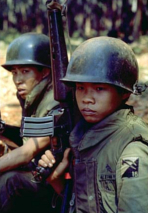I agree Lam Son was a failure. But you must look at the reasons why. The commander of that operation Hoang Xuan Lam wasn't an aggressive commander who could command a large scale operation. Thieu replaced him with General Do Cao Tri, one of the best generals in South Vietnam (nicknamed South Vietnamese Patton by Americans) who commanded the successful Cambodian Incursion. However, General Tri died in a helicopter crash when flying to take command. They replaced him with General Nguyen Van Minh, who was also a less aggressive commander. Furthermore, Saigon didn't commit its armored reserve or additional reinforcements into the battle, They chose to keep aggressive units in firebases rather than out fighting, This made those troops sitting ducks to the communist. The defeat at Lam Son wasn't due to bad soldiers, it was due to bad leadership. Furthermore, the US cared more about its lives than the South Vietnamese. Many times, the South Vietnamese received no air support due to a US downed pilot in the region. I didn't discuss Lam Son because previous you talked about a scenario without US air support. If Lam Son is ok to talk about, then so should the 1972 Offensive.If we seriously list every single engagement (define as platoon level of 30 men and up), we might have a clear-cut answer on the effectiveness of Vietnamisation program on ARVN (I'm in engineering department, so I work with numbers to analyse a problem, sue me). Furthermore, I focus more on operational and strategic layer (rather than single battle). Operation Lam Son 719 (1971) sees "operational failure of RVN" (according to Wiki), which can be classified as a victory/success for NVA/NLF. Summer Offensive 1972 is more inconclusive, but by the end, the NVA/NLF gains more territory and diplomatic pressure.
Because Ha Noi and Hai Phong are still secured by French in 1954, I don't envision the US troops landing there. In order to counter the DRVN/Viet Minh attack in DBP, it is better to cut off their supply line, which is why I propose regular US troops landing on Thanh Hoa as well as dropping into the jungle. If you play your cards correctly, you might win the battle (at the cost of serious international geo-politics), intra-Vietnam speaking, you win DBP by keeping it in French hands, you will make the whole First Indochina War less of a shitshow for France
Yes, South Vietnam lost land in the 1972 offensive, especially at the borders. This isn't a surprise, because South Vietnamese forces were spread thin throughout the country (800 mile long border I believe). It's no surprise that some land would be lost in full-scale invasion. Yet, the South Vietnamese held out at An Loc, Kontum, and Hue which were major battles between South Vietnamese and North Vietnamese divisions. They lost Quang Tri during the initial rout (General Lam was removed from command and replaced with General Truong). General Truong stabilized the situation at Hue and counter attacked and pushed the North out of Quang Tri. They only stopped recapturing land due to the Peace Agreement being signed. Those battles shouldn't be invalidated due to the presence of US air support. US airpower without troops is nothing. The Ho Chi Minh trail's existence is proof of this. Furthermore, the advantage of airpower evens the battlefield because the North Vietnamese had superior artillery firepower (longer range guns) that made allied force's own artillery guns defenseless.
Remember, what were the North Vietnamese objective? To destroy South Vietnam in one blow. They expected the people of the South to rise up in massive numbers, but that didn't happen. In fact, over 100,000 men enlisted that year to fight for the South. The Battle for An Loc was crucial because had the city fell, the communist would be only 22 miles away from an armored push into Saigon.

